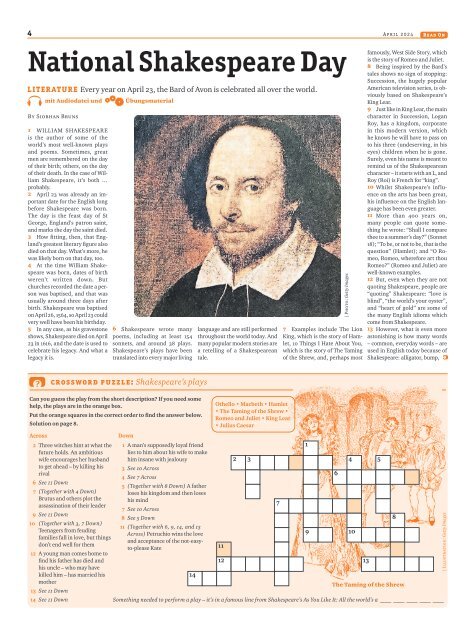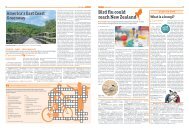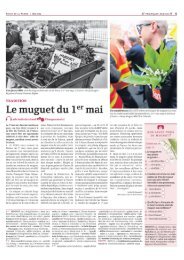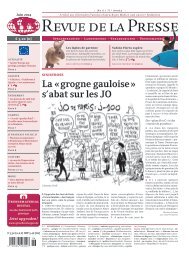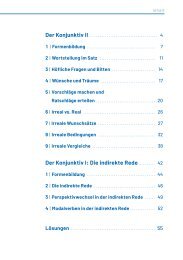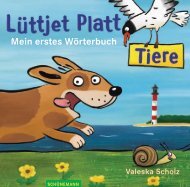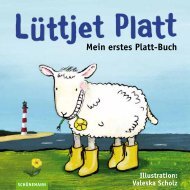Leseprobe Read On April 2024
Shakspeare, mit Übungsmaterial und Kreuzworträtsel
Shakspeare, mit Übungsmaterial und Kreuzworträtsel
Create successful ePaper yourself
Turn your PDF publications into a flip-book with our unique Google optimized e-Paper software.
4 <strong>April</strong> <strong>2024</strong> <strong>Read</strong> <strong>On</strong><br />
National Shakespeare Day<br />
LITERATURE Every year on <strong>April</strong> 23, the Bard of Avon is celebrated all over the world.<br />
mit Audiodatei und<br />
By Siobhan Bruns<br />
1 WILLIAM SHAKESPEARE<br />
is the author of some of the<br />
world’s most well-known plays<br />
and poems. Sometimes, great<br />
men are remembered on the day<br />
of their birth; others, on the day<br />
of their death. In the case of William<br />
Shakespeare, it’s both …<br />
probably.<br />
2 <strong>April</strong> 23 was already an important<br />
date for the English long<br />
before Shakespeare was born.<br />
The day is the feast day of St<br />
George, England’s patron saint,<br />
and marks the day the saint died.<br />
3 How fitting, then, that England’s<br />
greatest literary figure also<br />
died on that day. What’s more, he<br />
was likely born on that day, too.<br />
4 At the time William Shakespeare<br />
was born, dates of birth<br />
weren’t written down. But<br />
churches recorded the date a person<br />
was baptised, and that was<br />
usually around three days after<br />
birth. Shakespeare was baptised<br />
on <strong>April</strong> 26, 1564, so <strong>April</strong> 23 could<br />
very well have been his birthday.<br />
5 In any case, as his gravestone<br />
shows, Shakespeare died on <strong>April</strong><br />
23 in 1616, and the date is used to<br />
celebrate his legacy. And what a<br />
legacy it is.<br />
Übungsmaterial<br />
6 Shakespeare wrote many<br />
poems, including at least 154<br />
sonnets, and around 38 plays.<br />
Shakespeare’s plays have been<br />
translated into every major living<br />
language and are still performed<br />
throughout the world today. And<br />
many popular modern stories are<br />
a retelling of a Shakespearean<br />
tale.<br />
Photo: Getty Images<br />
|<br />
7 Examples include The Lion<br />
King, which is the story of Hamlet,<br />
10 Things I Hate About You,<br />
which is the story of The Taming<br />
of the Shrew, and, perhaps most<br />
famously, West Side Story, which<br />
is the story of Romeo and Juliet.<br />
8 Being inspired by the Bard’s<br />
tales shows no sign of stopping:<br />
Succession, the hugely popular<br />
American television series, is obviously<br />
based on Shakespeare’s<br />
King Lear.<br />
9 Just like in King Lear, the main<br />
character in Succession, Logan<br />
Roy, has a kingdom, corporate<br />
in this modern version, which<br />
he knows he will have to pass on<br />
to his three (undeserving, in his<br />
eyes) children when he is gone.<br />
Surely, even his name is meant to<br />
remind us of the Shakespearean<br />
character – it starts with an L, and<br />
Roy (Roi) is French for “king”.<br />
10 Whilst Shakespeare’s influence<br />
on the arts has been great,<br />
his influence on the English language<br />
has been even greater.<br />
11 More than 400 years on,<br />
many people can quote something<br />
he wrote: “Shall I compare<br />
thee to a summer’s day?” (Sonnet<br />
18); “To be, or not to be, that is the<br />
question” (Hamlet); and “O Romeo,<br />
Romeo, wherefore art thou<br />
Romeo?” (Romeo and Juliet) are<br />
well-known examples.<br />
12 But, even when they are not<br />
quoting Shakespeare, people are<br />
“quoting” Shakespeare: “love is<br />
blind”, “the world’s your oyster”,<br />
and “heart of gold” are some of<br />
the many English idioms which<br />
come from Shakespeare.<br />
13 However, what is even more<br />
astonishing is how many words<br />
– common, everyday words – are<br />
used in English today because of<br />
Shakespeare: alligator, bump,<br />
crossword puzzle: Shakespeare’s plays<br />
Can you guess the play from the short description? If you need some<br />
help, the plays are in the orange box.<br />
Put the orange squares in the correct order to find the answer below.<br />
Solution on page 8.<br />
Across<br />
2 Three witches hint at what the<br />
future holds. An ambitious<br />
wife encourages her husband<br />
to get ahead – by killing his<br />
rival<br />
6 See 11 Down<br />
7 (Together with 4 Down)<br />
Brutus and others plot the<br />
assassination of their leader<br />
9 See 11 Down<br />
10 (Together with 3, 7 Down)<br />
Teenagers from feuding<br />
families fall in love, but things<br />
don’t end well for them<br />
12 A young man comes home to<br />
find his father has died and<br />
his uncle – who may have<br />
killed him – has married his<br />
mother<br />
13 See 11 Down<br />
14 See 11 Down<br />
Down<br />
1 A man’s supposedly loyal friend<br />
lies to him about his wife to make<br />
him insane with jealousy<br />
3 See 10 Across<br />
4 See 7 Across<br />
5 (Together with 8 Down) A father<br />
loses his kingdom and then loses<br />
his mind<br />
7 See 10 Across<br />
8 See 5 Down<br />
11 (Together with 6, 9, 14, and 13<br />
Across) Petruchio wins the love<br />
and acceptance of the not-easyto-please<br />
Kate<br />
14<br />
Othello • Macbeth • Hamlet<br />
• The Taming of the Shrew •<br />
Romeo and Juliet • King Lear<br />
• Julius Caesar<br />
11<br />
1<br />
2 3 4 5<br />
7<br />
6<br />
9 10<br />
12 13<br />
Something needed to perform a play – it’s in a famous line from Shakespeare’s As You Like It: All the world’s a —— —— —— —— ——<br />
8<br />
The Taming of the Shrew<br />
Illustration: Getty Images<br />
|
<strong>Read</strong> <strong>On</strong> <strong>April</strong> <strong>2024</strong><br />
5<br />
countless, eventful, generous,<br />
gloomy, laughable, road,<br />
suspicious, and many, many<br />
more.<br />
14 Shakespeare’s “works provide<br />
the first recorded use of<br />
over 1,700 words in the English<br />
language. It is believed that he<br />
may have invented or introduced<br />
many of these words himself, often<br />
by combining words, changing<br />
nouns into verbs, adding<br />
prefixes or suffixes, and so on”,<br />
the website for the Shakespeare<br />
Birthplace Trust writes.<br />
15 Some celebrate National<br />
Shakespeare Day by reading his<br />
poetry or seeing one of his plays.<br />
Others really get into the spirit of<br />
things by dressing up in Elizabethan<br />
clothing and speaking like<br />
Shakespeare on <strong>April</strong> 23 – using<br />
thou and thee and putting “th” at<br />
the end of verbs: Thou goeth to<br />
the shops, I see.<br />
16 But there’s an easier way to<br />
honour the Bard on National<br />
Shakespeare Day – just speak<br />
English.<br />
0 – 2 THE BARD of Avon “"eIv´n‘ der Barde von Avon (Spitzname für Shakespeare)<br />
— great bedeutend — feast day of St George “fi…st‘ Georgstag; feast<br />
day Gedenktag eines(-r) Heiligen — patron saint “ÆpeItr´n"seInt‘<br />
Schutzpatron(in); saint Heilige(r) — to mark erinnern an<br />
3 – 5 fitting passend — literary figure “"lIt´r´ri‘ Literat(in) — what’s more<br />
überdies — to record s.th. etw. schriftlich festhalten — to baptise s.o.<br />
“bœp"taIz‘ jdn. taufen — very well sehr wohl — in any case auf jeden Fall —<br />
legacy “"leg´si‘ Erbe<br />
6 sonnet “"--‘ Sonett (Gedicht aus 14 Verszeilen) — major “"meIdZ´‘ groß<br />
— throughout the world auf der ganzen Welt — retelling Nacherzählung —<br />
Shakespearean “ÆSeIk"spI´ri´n‘ shakespearesche(r, s) — tale Geschichte<br />
7 – 8 The Lion King dt. Titel: Der König der Löwen — 10 Things I Hate About<br />
You dt. Titel: 10 Dinge, die ich an Dir hasse — The Taming of the Shrew<br />
“"teImIN; Sru…‘ dt. Titel: Der Widerspenstigen Zähmung — Juliet “"dZu…li´t‘ — to<br />
show no sign of stopping kein Ende nehmen — succession “s´k"seS´n‘ Nachfolge<br />
— hugely äußerst — obviously “"Åbvi´sli‘ offensichtlich<br />
9 – 10 kingdom “"kINd´m‘ Königreich — corporate “"kO…p´r´t‘ h.: in Form eines<br />
Unternehmens — to pass s.th. on to s.o. etw. an jdn. weitergeben — undeserving<br />
“ÆøndI"z‰…vIN‘ unwürdig — gone tot — to be meant to do s.th. etw. tun<br />
sollen — influence “"Influ´ns‘ Einfluss<br />
11 – 12 ... years on ... Jahre später — to quote s.th. “kw´Ut‘ etw. zitieren — thee<br />
“Di…‘ dich — wherefore warum — art bist — thou “DaU‘ du — love is blind<br />
Liebe macht blind — the world’s your oyster die Welt liegt dir zu Füßen —<br />
heart of gold Herz aus Gold — idiom “"Idi´m‘ Redewendung<br />
13 astonishing “´"stÅnISIN‘ erstaunlich — common gewöhnlich — everyday<br />
alltäglich — bump Beule — countless zahllos — eventful ereignisreich<br />
— generous “"dZen´r´s‘ großzügig — gloomy düster — laughable “"lA…f´b´l‘<br />
lachhaft — suspicious “s´"spIS´s‘ verdächtig; misstrauisch<br />
14 – 16 work Werk — to introduce s.th. “ÆIntr´"dZu…s‘ etw. einführen — prefix<br />
“"pri…fIks‘ Präfix — to get into the spirit of things “"spIrIt‘ sich auf etw. einstimmen<br />
— to dress up sich verkleiden — Elizabethan “iÆlIz´"bi…T´n‘ elisabethanisch<br />
— clothing “"kl´UDIN‘ Kleidung — to honour s.o. “"Ån´‘ jdn. ehren<br />
Othello<br />
Macbeth<br />
language corner<br />
Shakespearean idioms<br />
By Siobhan Bruns<br />
Julius Caesar<br />
Hamlet<br />
1 WHAT SHAKESPEARE<br />
wrote over 400 years ago lives on<br />
in many common English idioms<br />
we still use today. Here are some<br />
of them, together with their modern<br />
meanings:<br />
2 Dead as a doornail<br />
Dead beyond any doubt.<br />
Break the ice<br />
To do or say something that<br />
makes people who do not know<br />
each other feel more comfortable.<br />
A charmed life<br />
A lucky life, without problems.<br />
3 Good riddance<br />
To be happy when someone or<br />
something is gone.<br />
In a pickle<br />
To be in a difficult or uncomfortable<br />
situation.<br />
Mum’s the word<br />
To keep a secret; to stay silent.<br />
4 Night owl<br />
A person who stays up and is active<br />
late into the night.<br />
Send someone packing<br />
To send someone away forcefully;<br />
to insist someone leave.<br />
Wild goose chase<br />
A search that is unsuccessful and<br />
pointless.<br />
Vanish into thin air<br />
To suddenly and completely disappear.<br />
0 – 3 SHAKESPEAREAN<br />
“SeIk"spI´ri´n‘ shakespeare sche(r, s)<br />
— idiom “"Idi´m‘ Redewendung —<br />
dead as a doornail (fig) mausetot —<br />
beyond any doubt “bi"Ånd; daUt‘ ohne<br />
jeden Zweifel — charmed vom Glück<br />
gesegnet — good riddance “"rId´ns‘<br />
Ein Glück, dass wir den/die los sind!<br />
— mum’s the word kein Wort darüber<br />
— to stay silent “"saIl´nt‘ schweigen<br />
4 owl “aUl‘ Eule — forcefully<br />
energisch — to insist “-"-‘ darauf bestehen<br />
— goose Gans — chase Jagd<br />
— pointless sinnlos — to vanish into<br />
thin air “"vœnIS‘ sich in Luft auflösen<br />
(to vanish verschwinden)<br />
King Lear<br />
Romeo and Juliet<br />
Images: Getty Images<br />
|
Worksheet by Jennifer Kerr<br />
National Shakespeare Day<br />
<strong>Read</strong> <strong>On</strong> • <strong>April</strong> <strong>2024</strong> • page 4 Page 1 of 7<br />
Pre-reading<br />
The article you are going to read is about Shakespeare. See how much you already know<br />
about Shakespeare by answering the following questions. Work together in pairs, and<br />
discuss your answers.<br />
a) What is Shakespeare’s first name?<br />
Ο<br />
Ο<br />
Ο<br />
James<br />
Edward<br />
William<br />
b) What was Shakespeare’s nationality?<br />
Ο<br />
Ο<br />
Ο<br />
English<br />
American<br />
Canadian<br />
c) What was Shakespeare’s occupation?<br />
Ο<br />
Ο<br />
Ο<br />
Painter<br />
Writer<br />
Singer<br />
d) When was Shakespeare born?<br />
Ο 1364<br />
Ο 1564<br />
Ο 1864<br />
e) Which of the following works are from Shakespeare?<br />
Ο<br />
Ο<br />
Ο<br />
Ο<br />
Ο<br />
Ο<br />
Ο<br />
Romeo and Juliet<br />
Faust<br />
Hamlet<br />
Macbeth<br />
Oliver Twist<br />
Pride and Prejudice<br />
A Midsummer Night’s Dream<br />
© <strong>2024</strong> Carl Ed. Schünemann KG. Alle Rechte vorbehalten.
National Shakespeare Day<br />
<strong>Read</strong> <strong>On</strong> • <strong>April</strong> <strong>2024</strong> • page 4 Page 2 of 7<br />
Grammar<br />
Below are the first three paragraphs of the article, but here they contain grammar mistakes.<br />
There are seven mistakes in total (a–g).<br />
Find and highlight the mistakes, then write the corrections on the right. Check with your<br />
partner.<br />
1 William Shakespeare is the author of some of the worlds most wellknown<br />
plays and poems. Some times, great men are remembered on the day<br />
of their birth; others, on the day of there death. In the case of William<br />
__________(a)<br />
__________(b)<br />
__________(c)<br />
Shakespeare, it’s both … probably.<br />
2 <strong>April</strong> 23 was already a important date for the English long before<br />
Shakespeare was born. The day is the feast day of St George, england’s<br />
__________(d)<br />
__________(e)<br />
patron saint, and marks the day the saint died.<br />
3 How fitting, then, that England’s greatest literary figure also was dead<br />
on that day. What’s more, he was likely born on that day, to.<br />
__________(f)<br />
__________(g)<br />
<strong>Read</strong>ing comprehension<br />
1. <strong>Read</strong> the article once all the way through. Then write down five pieces of information<br />
about Shakespeare from the article. Write in full sentences. Then compare your five facts<br />
with those of your partner.<br />
- ___________________________________________________________________________<br />
- ___________________________________________________________________________<br />
- ___________________________________________________________________________<br />
- ___________________________________________________________________________<br />
- ___________________________________________________________________________<br />
© <strong>2024</strong> Carl Ed. Schünemann KG. Alle Rechte vorbehalten.
National Shakespeare Day<br />
<strong>Read</strong> <strong>On</strong> • <strong>April</strong> <strong>2024</strong> • page 4 Page 3 of 7<br />
2. Now decide if the following statements are true (T), false (F), or not mentioned (N) in the<br />
article. Then write corrections for the false statements in the spaces provided below.<br />
<strong>Read</strong> the article again if needed.<br />
Statement T F N<br />
a) National Shakespeare Day is on <strong>April</strong> 23. Ο Ο Ο<br />
b) Shakespeare died in the year 1616. Ο Ο Ο<br />
c) Shakespeare had three brothers. Ο Ο Ο<br />
d) Shakespeare wrote at least 154 plays. Ο Ο Ο<br />
e) Shakespeare is more famous in America than in England. Ο Ο Ο<br />
f)<br />
Shakespeare wrote The Lion King.<br />
Ο<br />
Ο<br />
Ο<br />
g)<br />
The TV series Succession is based on Shakespeare’s work.<br />
Ο<br />
Ο<br />
Ο<br />
h)<br />
The quote “To be, or not to be, that is the question” is from<br />
Romeo and Juliet.<br />
Ο<br />
Ο<br />
Ο<br />
i)<br />
“The world’s your oyster” is a quote that comes from<br />
Shakespeare.<br />
Ο<br />
Ο<br />
Ο<br />
j)<br />
Shakespeare invented the word ‘play’.<br />
Ο<br />
Ο<br />
Ο<br />
Now rewrite the false statements from above, using the correct information from the article.<br />
____________________________________________________________________________<br />
____________________________________________________________________________<br />
____________________________________________________________________________<br />
____________________________________________________________________________<br />
____________________________________________________________________________<br />
© <strong>2024</strong> Carl Ed. Schünemann KG. Alle Rechte vorbehalten.
National Shakespeare Day<br />
<strong>Read</strong> <strong>On</strong> • <strong>April</strong> <strong>2024</strong> • page 4 Page 4 of 7<br />
Use of English<br />
1. Find synonyms (>>) in the article for the words and expressions below. The paragraphs<br />
where you can find the words and expressions are indicated in brackets.<br />
a) significant (>>) ________________ (para. 1)<br />
b) big (>>) ________________ (para. 6)<br />
c) tale (>>) ________________ (para. 7)<br />
d) extremely (>>) ________________ (para. 8)<br />
e) clearly (>>) ________________ (para. 8)<br />
f) not worthy (>>) ________________ (para. 9)<br />
g) impact (>>) ________________ (para. 10)<br />
h) phrase (>>) ________________ (para. 12)<br />
i) surprising (>>) ________________ (para. 13)<br />
j) outfits (>>) ________________ (para. 15)<br />
2. Below are nine words from the article.<br />
a) First make sure you understand the meaning of all the words. You can check in a<br />
dictionary or ask your teacher.<br />
b) Now work in pairs. You are going to take it in turns to describe one of the words, but<br />
DON’T tell your partner which word you are describing. Your partner must try and guess<br />
the word based on your description. You cannot say any part of the word, so you must<br />
find other words (for example, synonyms) to describe it.<br />
feast day common sonnet<br />
corporate Elizabethan prefix<br />
Juliet patron saint kingdom<br />
© <strong>2024</strong> Carl Ed. Schünemann KG. Alle Rechte vorbehalten.
National Shakespeare Day<br />
<strong>Read</strong> <strong>On</strong> • <strong>April</strong> <strong>2024</strong> • page 4 Page 5 of 7<br />
Post-reading<br />
1. In small groups, discuss the following questions related to the article:<br />
a) Have you read any of Shakespeare’s plays or sonnets, seen one of his plays performed live, or<br />
watched a film version of his work? If yes, tell the group which ones you’ve read or seen. Did you<br />
like them?<br />
b) Do you think it is important to have days like National Shakespeare Day to celebrate historical<br />
figures? Why or why not? Can you think of any similar days in your country?<br />
c) Brainstorm some literary figures of similar standing to Shakespeare from other countries. Try to<br />
note down some of their most famous works. Use the space provided below.<br />
Famous literary figures<br />
and their works<br />
2. Now work in pairs, and try to complete this word search. There are three Shakespeare<br />
quotes and eight words thought to have been invented by Shakespeare hidden in the<br />
word search. They can be spelled horizontally, vertically, or diagonally. <strong>On</strong>e is found for<br />
you as an example.<br />
Here are the quotes and words you need to find:<br />
to be or not to be heart of gold love is blind<br />
road suspicious countless laughable<br />
gloomy bump eventful generous<br />
© <strong>2024</strong> Carl Ed. Schünemann KG. Alle Rechte vorbehalten.
National Shakespeare Day<br />
<strong>Read</strong> <strong>On</strong> • <strong>April</strong> <strong>2024</strong> • page 4 Page 6 of 7<br />
© <strong>2024</strong> Carl Ed. Schünemann KG. Alle Rechte vorbehalten.
National Shakespeare Day<br />
<strong>Read</strong> <strong>On</strong> • <strong>April</strong> <strong>2024</strong> • page 4 Page 7 of 7<br />
Answer key<br />
Pre-reading<br />
a) William • b) English • c) Writer • d) 1564 • e) Romeo and Juliet, Hamlet, Macbeth, A Midsummer Night’s<br />
Dream<br />
Grammar<br />
a) worlds → world’s • b) Some times → Sometimes • c) there → their • d) a → an • e) england’s → England’s •<br />
f) was dead → died • g) to → too<br />
<strong>Read</strong>ing comprehension<br />
1. Sample answer: Shakespeare was baptised on <strong>April</strong> 26, 1564. • The Lion King is based on Shakespeare’s<br />
Hamlet. • The television series Succession was inspired by one of Shakespeare’s plays. • “Love is blind” is<br />
an idiom that comes from Shakespeare. • Shakespeare’s works introduced many new English words.<br />
2. a) True (para. 0) • b) True (para. 5) • c) Not mentioned (-) • d) False – Shakespeare wrote around 38<br />
plays and at least 154 sonnets. (para. 6) • e) Not mentioned • f) False – The Lion King was based on a<br />
play Shakespeare wrote, Hamlet. (para. 7) • g) True (para. 8) • h) False – “To be, or not to be, that is the<br />
question” is a quote from Hamlet. (para. 11) • i) True (para. 12) • j) Not mentioned (-)<br />
Use of English<br />
1. a) great • b) major • c) story • d) hugely • e) obviously • f) underserving • g) influence • h) idiom •<br />
i) astonishing • j) clothing<br />
Post-reading<br />
2.<br />
<strong>Read</strong> <strong>On</strong> im Klassensatz: Sichern Sie sich Ihre Vorteile. Jetzt hier bestellen!<br />
Hinweis: Die Zugangsdaten zu Ihrem persönlichen Abo dürfen Sie nicht an Dritte weitergeben.<br />
© <strong>2024</strong> Carl Ed. Schünemann KG. Alle Rechte vorbehalten.


